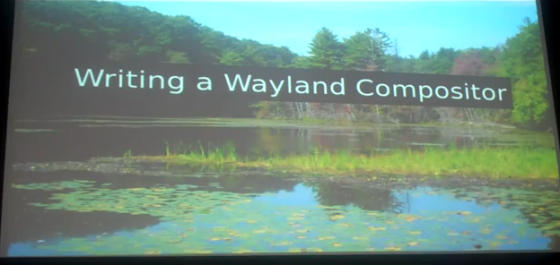The recently concluded Free and Open Source Software Developers’ European Meeting (FOSDEM) 2012, held in Brussels, Belgium between 4 and 5 February, was a huge success with a number of dignitaries in the field talking about various open source projects of their own. Wayland was one such one such open source project that created a lot of buzz at the event. Kristian Høgsberg, founder and maintainer of the Wayland project, talked about Wayland 1.0 and put forward many other interesting technical discussions at the event. However the talk that caught everyone’s attention was about Wayland compositors, which included Tizen’s Dawati on a hybrid X-Wayland compositor, GNOME Shell on Wayland with Mutter, and much more.
Titled “How-to write a Wayland compositor,” the talk was held in the X.Org development room and was anchored by Robert Bragg and Neil Roberts. Robert and Neil are open source developers, tasked with Wayland, at Intel‘s London Center of Open-Source Technology (OTC). During the 45-minute long presentation, Robert and Neil largely talked about Wayland’s Weston compositor. The screen for their presentation happened to be Dawati, an open-source user-interface expected to be the reference design for Tizen. If you’re not aware, Tizen is a Linux based open-source operating system and a product of Moblin and MeeGo merge. The duo ported the Dawati shell interface to be running on an XWayland-based compositor, which pairs X.Org element support with Wayland.
The 45-minute presentation also included talks about non-Weston compositors like Cogland (a COGL-based Wayland compositor), a small Clutter-based compositor with X and Wayland clients working together. The presentation also included a hybrid Mutter compositor for GNOME Shell on Wayland with Mutter being the manager for XWayland.
Watch the video embedded below to find out more about the presentation.
Most Popular Tech Stories
- Kelly Betting – How It Works and the Kelly Criterion Explained
- What are Pokies? – The Latest Guide to How Pokies Work in Australia
- AI industry needs annual revenues of more than the UAE’s GDP to offset costs
- Pepe Unchained Meme Token ICO Hits $2 Million – Could PEPU See a Post-Launch Surge Like PEPE?
- 4 Best Meme Coins to Buy with 100x Gains Potential – Top Picks for July 2024
Latest News
Does AI increase productivity at work? New study suggests otherwise
Artificial intelligence software reduces productivity and harms the working environment, according to a study from the freelance platform, Upwork. The findings appear to question how AI is being deployed at...


















